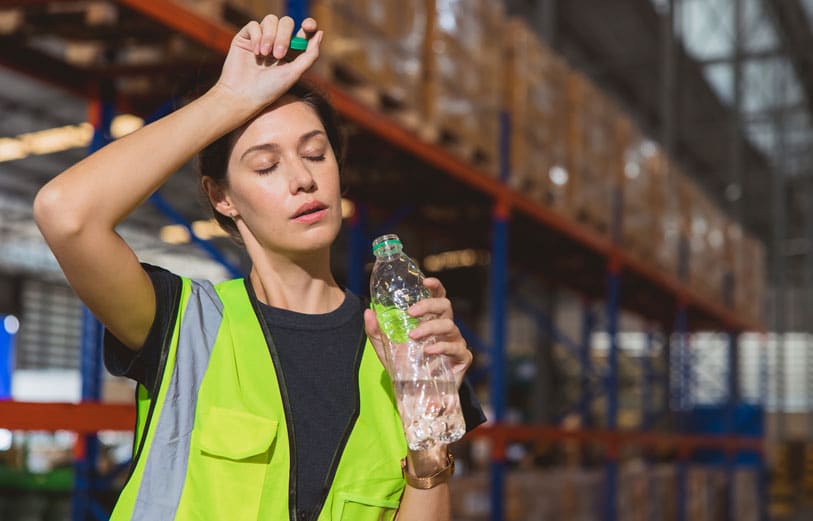Heat Safety: Protecting Yourself During Hot Summer Weather

Learn how to help protect yourself and your loved ones from heat-related illnesses during summer's hot weather.
Why is heat safety essential to your health?
Heat safety is critically important during the summer months. The season's long days and sweltering heat and humidity can pose serious health risks. These risks become even more threatening for those people who must work outside or those who have few options for relief from the heat.
What groups require additional precautions?
Some individuals are more vulnerable to excessive heat due to body size, health conditions, physical activity, and hydration levels. People in the following groups should take extra precautions to avoid heat-related illnesses.
Senior adults: As we age, our ability to sweat is reduced, and our internal body temperature regulation becomes less efficient. These factors increase the risk of succumbing to heat-related illness.
Young children: Their larger surface area relative to their small body size reduces their ability to tolerate prolonged heat exposure and fluid loss.
People with chronic health conditions: Those with heart disease, diabetes, or lung disease are at higher risk for heat-related illness. This is due to the additional stress heat exposure and fluid loss places on their bodies.
Outdoor Workers and Exercisers: These individuals are more likely to experience extended heat exposure and dehydration, which undoubtedly increases their vulnerability.
What are the three stages of heat-related illnesses?
Heat-related illnesses occur when your body becomes overheated and can no longer cool itself efficiently. These illnesses are typically categorized into one of three progressive stages, ranging from mild to severe:
- Heat cramps: Strenuous activity in hot weather can cause muscle cramps, weakness, and profuse sweating. Once these symptoms start, decrease your activity, drink healthy fluids, and reduce your exposure to the heat.
- Heat exhaustion: Prolonged exposure to high temperatures may lead to heavy sweating, pale skin, headache, dizziness, and nausea. Hence, if your symptoms have progressed to this stage, initiate as many steps as possible to hydrate and reduce the individual’s core body temperature.
- Heat stroke: This is the most severe stage, characterized by a high body temperature (above 103°F), hot, dry skin, rapid pulse, and confusion. If a heat stroke is suspected, medical attention is necessary. Call 911, remain with the individual, take action immediately to cool the person, provide fluids, and encourage them to rest until medical help arrives.
What are among the most essential heat safety tips?
General:
- Stay hydrated: Drink plenty of fluids, even if you don't feel thirsty. Avoid alcohol and caffeine because they can dehydrate you.
- Limit strenuous activity: Avoid strenuous activities during the hottest part of the day, or anytime you have had extended exposure to heat or are inadequately hydrated.
- Check on Others: During periods of excessive heat, check in on friends, elderly neighbors, and relatives regularly.
- Eat smart: Consume small, frequent meals high in fluids and nutrition.
- Become “medication-aware”: Check with your doctor if your medication affects your body's heat regulation.
- Never leave children or pets in cars: The temperature inside a parked car can rise rapidly to dangerous levels.
- Pet care: Ensure your pets have plenty of water and shade or other relief from the heat.
At Home:
- Stay cool indoors: Spend as much time as possible in an air-conditioned environment.
- Cool showers: Take cool showers or baths to lower your body temperature.
- Limit appliance use: Avoid using stoves and ovens that can heat your home.
- Use fans wisely: Do not rely on a fan as your only cooling device during extreme heat.
Have a plan with a variety of options to be sure you and your loved ones can get adequate relief from the heat.
Outdoors:
- Dress appropriately: Wear loose-fitting, light-colored clothing.
- Take breaks: Find shade or air-conditioned locations to cool down periodically.
- Use sunscreen: Protect your skin with sunscreen of SPF 30 or higher.
- Stay hydrated: Have access to water and drink it regularly.
Spread the Word and Stay Informed
Heat safety precautions benefit everyone. Share this information with friends and family, and stay alert to heat-related illness symptoms.
Remember, recognizing the signs of heat-related illness and knowing how to respond can save lives. The Moultrie County Health Department encourages you to stay cool, stay hydrated, and enjoy the summer safely!

